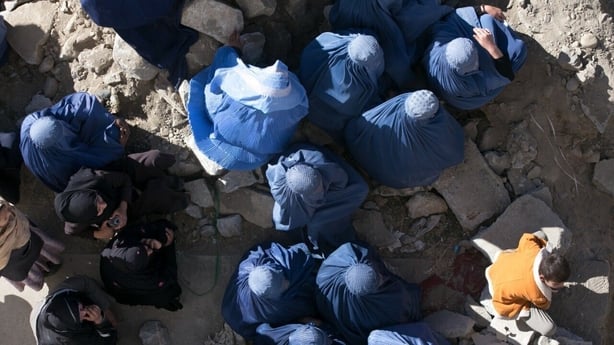Afghanistan's finance ministry under the Taliban government has prepared a draft national budget that, for the first time in two decades, is funded without foreign aid, a spokesman said.
It comes as the country is mired in economic crisis and faces a looming humanitarian catastrophe that the United Nations has called an "avalanche of hunger".
Finance ministry spokesman Ahmad Wali Haqmal did not disclose the size of the draft budget - which runs until December 2022 - but said it would go to the cabinet for approval before being published.
"We are trying to finance it from our domestic revenues - and we believe we can," he told state television in an interview shared on Twitter.
Global donors suspended financial aid when the Taliban seized power in August and Western powers also froze access to billions of dollars in assets held abroad.

The 2021 budget, put together by the previous administration under IMF guidance, projected a deficit despite 219 billion Afghanis ($2.7 billion at the time) in aid and grants and 217 billion from domestic revenue.
At that time, the exchange rate was around 80 Afghanis to the dollar, but the local currency has been hammered since the Taliban's return, particularly in the past week, slumping to 130 on Monday before recovering Friday to around 100.
Mr Haqmal accepted that public servants are still owed several months of wages, saying "we are trying our best" to make good on overdue pay by year-end.
He warned, however, a new pay scale had also been prepared.
The new government's revenue department said last month that it had collected 26 billion Afghanis in the previous two and a half months, including 13 billion in customs duties.
It also announced a new Islamic tax to fund aid projects for poor people and orphans.
An Afghan economist who asked not to be named said today that the new budget would likely end up being only a quarter of that for 2021.
"The Taliban are saying they have more transparency at the border crossings," meaning fewer goods dodge duties than previously, this economist said.
But, he said, even if true, maximum revenues would only be about 100 billion Afghanis because the intensifying recession will shrink the tax take to a far greater extent.
Taliban appeal again for UN seat after Afghan ambassador quits
The Taliban made a fresh appeal today for Afghanistan's seat at the United Nations after the ambassador of the former US-backed government left his post.
The UN seat, and some other embassies abroad, are at the centre of a tug-of-war between exiled diplomats of the old government and Afghanistan's new Islamist rulers.
No country has yet recognised the Taliban regime.
Assistant UN spokesman Farhan Haq said that Afghan ambassador Ghulam Isaczai "relinquished his position as of 15 December", according to a letter they received yesterday.
The Taliban's nominee for the position, Suhail Shaheen, said the seat should be now given to the new government of Afghanistan, adding it was a matter of credibility for the world body.
The current government in Afghanistan "has sovereignty" over the country, he said on Twitter.
2/2
— Suhail Shaheen. محمد سهیل شاهین (@suhailshaheen1) December 17, 2021
Rules should supersede political preferences. Otherwise, its neutrality will be questioned.
Early this month, the UN General Assembly passed a resolution indefinitely delaying a decision over the rival claims.
But even a month after the Taliban takeover, Isaczai was still being received at UN headquarters -- and in November openly criticised the country's new rulers at a Security Council meeting.
When they previously ruled Afghanistan, from 1996 to 2001, the Taliban had no UN representation and their rule was recognised by just three countries -- Saudi Arabia, the United Arab Emirates and Pakistan.
UN-nominee Shaheen served as deputy ambassador to Islamabad during that period, becoming the movement's exiled spokesman after they were toppled and a favourite of foreign media because of his fluent English.

